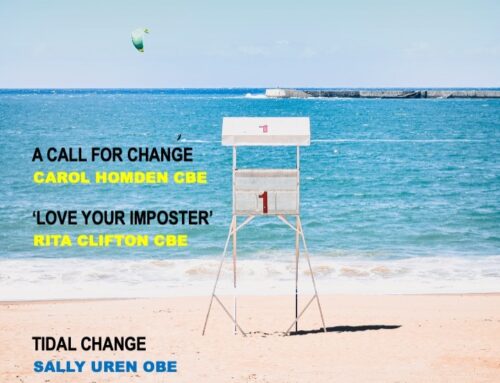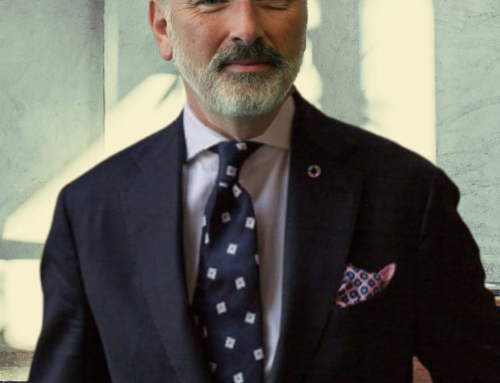Kindness – a Strategy, a Legacy

Regardless of your age, what you do, whether you are the non-stop busy executive, an aspiring entrepreneur or a stay-at-home-mom, 2020 has been a year unlike any other for all of us. And unlike anything that you or I would have ever imagined. My life has been turned upside down. My ventures are in turmoil and our projects came to a halt. The team’s stress levels skyrocketed.
The past 8 months have been a period in our lives when pretty much everything has been affected -and defined- by a threat of illness and worse: CoVid19. This is a virus, but one that was (and still is) little understood, brutal in all ways and different ways for many among us unpredictable and dangerous.
It is often in times of such crisis that we remember how vulnerable and fragile we are, how interdependent we are, and how much of what we do is mostly temporary. The line that separates life from emptiness is only a step away and can be crossed before we know it.
In March 2020 the world was split into two groups: the CoVid19 ‘direct victims’, counting lost ones and survivors; and the ‘indirect victims’: those whose physical health has not been affected, but for whom the economic and social impact of the crisis has changed their lives, both in the present and going forward.
Our work on leading from kindness had its start in a series of rich conversations. In April 2020 a group of executive women and others came together to explore the notion of ‘Kindness in Leadership’ in the times of crisis. Our aspiration was to go beyond the traditional or expected kindness interpretations such as affection, charity, courtesy, gentleness, or sweetness. We felt that these practices, though with value, tend to reflect a stereotype of kindness that is ultimately not about strength and resoluteness.
But, as we know, we are in the midst of extraordinary times — times that demand action, decision making, courage, compassion and confidence. Spurred by these conversations and together with Dr Marc Ventresca at the University of Oxford and with Said Business School EMBA colleagues Stephanie Gnissios and Shawn Ruggiero we embarked on a journey to discover ten unconventional interpretations of kindness in leadership in times of crisis. These findings are the outcome of a unique collaboration between Saïd Business School, Global Thinkers Forum, Women of the Future and Hall & Partners, which has looked at the value and practice of kind leadership in a crisis, compared with ‘normal’ everyday work and beyond.
For kindness in these times, we point to three core practices: Focus on shared well-being and a discipline to make possible interactions that contribute to such well-being, act in a spirit of generosity and appreciation, and conduct your own affairs with a focus on the longer-term, this to look beyond everyday hassles.
How can we find ways to support leaders in creating a ‘Kindness’ legacy, and what makes that timely and relevant? How to make kindness a way of being? Can it be integrated into the organisational culture in ways that will benefit all stakeholders?
Being “kind” takes energy. Being kind demands that we stop and think about how we are saying what we’re saying. How we act, and what the consequences of our actions for others will be. Most of us aren’t even aware of how abrupt we are. There’s no feedback coming in that tells us how we’re doing on the “kindness index.”
Recalling the American poet Maya Angelou’s trenchant observation: “People forget what you say but recall how you made them feel”.
So how does a company set out to build what I call “a culture of kindness?” Also, why would a company want to do this in the first place?
For the purposes of exploring kindness as an important skill and a manifestation of emotional intelligence, we interviewed business and thought leaders from more than 20 countries. They all agreed that the current pandemic has prompted a fresh view of kindness in practice. They also concluded that by demonstrating kindness we affirm social inclusion and we create the antidote to negative emotions in times of crisis. Nurturing the value of kindness should be a strategic decision for every leader who wishes to build a culture – and legacy – of greatness.
That being said, if you want a culture of kindness, you will need employees who experience your kindness in both personal and organizational terms. Generally, if people have healthy working conditions, they’re going to be feeling kind at work and that can have a hugely positive impact on your company’s output and bottom line.
A 2019 study in the journal Emotion looked at acts of kindness within a real-life working environment and showed that kindness really does create a positive ripple that affects the whole workplace culture and that generosity and kindness propagate and spread.
The researchers from the University of California studied workers from Coca Cola’s Madrid headquarters. The study group consisted of mostly female employees from a range of departments. Participants were told they were part of a happiness study, and once a week for four weeks, they checked in to report how they were feeling, in terms of mood and life satisfaction, and their experience of positive and negative behaviours. This included how many they had carried out towards others, and how many others had made towards them.
Four weeks later, the participants completed further measures, such as happiness and job satisfaction. There was a catch—19 of the participants were instructed by researchers to be the “givers,” where each week they performed some act of kindness towards some of their co-workers, who were not part of this control group. It was up to the altruistic group as to what generous acts they performed, and these included relatively simple things that we can often take for granted, such as bringing someone a drink and emailing a thank-you note.
The people who experienced kindness through the four weeks reported a sense of affinity and togetherness. In addition, the receivers felt in control at work and reported significantly higher levels of happiness. They also felt more autonomous, and more competent in their workplace.
Kindness can be a way of being. When people’s emotions are raw, we need a kindness that listens, and empowers, especially as crisis can be a period of trauma. Choosing to lead from a place of kindness is a practice, embedded into the identity of a leader, her stance and engagement across contexts.
We build on this research and other studies, to develop our ideas about leading from kindness as a form of practical action or intelligence, in the spirit of ‘emotional intelligence quotient’ (EQ). We look to explore a kindness quotient, or ‘KQ’. The complexity and depth of the global challenges we face will not dim. Leadership in these times requires embedding KQ into daily practice, with an iron-willed intention to manifest kindness through its many interpretations.
Elizabeth Filippouli
Founder, Global Thinkers Forum & Athena40
@ElizaFilippouli
@GlobalThinkersF
@Athena_40
LinkedIn
http://www.globalthinkersforum.org/
https://www.athena40forum.com/


Kindness – a Strategy, a Legacy

Regardless of your age, what you do, whether you are the non-stop busy executive, an aspiring entrepreneur or a stay-at-home-mom, 2020 has been a year unlike any other for all of us. And unlike anything that you or I would have ever imagined. My life has been turned upside down. My ventures are in turmoil and our projects came to a halt. The team’s stress levels skyrocketed.
The past 8 months have been a period in our lives when pretty much everything has been affected -and defined- by a threat of illness and worse: CoVid19. This is a virus, but one that was (and still is) little understood, brutal in all ways and different ways for many among us unpredictable and dangerous.
It is often in times of such crisis that we remember how vulnerable and fragile we are, how interdependent we are, and how much of what we do is mostly temporary. The line that separates life from emptiness is only a step away and can be crossed before we know it.
In March 2020 the world was split into two groups: the CoVid19 ‘direct victims’, counting lost ones and survivors; and the ‘indirect victims’: those whose physical health has not been affected, but for whom the economic and social impact of the crisis has changed their lives, both in the present and going forward.
Our work on leading from kindness had its start in a series of rich conversations. In April 2020 a group of executive women and others came together to explore the notion of ‘Kindness in Leadership’ in the times of crisis. Our aspiration was to go beyond the traditional or expected kindness interpretations such as affection, charity, courtesy, gentleness, or sweetness. We felt that these practices, though with value, tend to reflect a stereotype of kindness that is ultimately not about strength and resoluteness.
But, as we know, we are in the midst of extraordinary times — times that demand action, decision making, courage, compassion and confidence. Spurred by these conversations and together with Dr Marc Ventresca at the University of Oxford and with Said Business School EMBA colleagues Stephanie Gnissios and Shawn Ruggiero we embarked on a journey to discover ten unconventional interpretations of kindness in leadership in times of crisis. These findings are the outcome of a unique collaboration between Saïd Business School, Global Thinkers Forum, Women of the Future and Hall & Partners, which has looked at the value and practice of kind leadership in a crisis, compared with ‘normal’ everyday work and beyond.
For kindness in these times, we point to three core practices: Focus on shared well-being and a discipline to make possible interactions that contribute to such well-being, act in a spirit of generosity and appreciation, and conduct your own affairs with a focus on the longer-term, this to look beyond everyday hassles.
How can we find ways to support leaders in creating a ‘Kindness’ legacy, and what makes that timely and relevant? How to make kindness a way of being? Can it be integrated into the organisational culture in ways that will benefit all stakeholders?
Being “kind” takes energy. Being kind demands that we stop and think about how we are saying what we’re saying. How we act, and what the consequences of our actions for others will be. Most of us aren’t even aware of how abrupt we are. There’s no feedback coming in that tells us how we’re doing on the “kindness index.”
Recalling the American poet Maya Angelou’s trenchant observation: “People forget what you say but recall how you made them feel”.
So how does a company set out to build what I call “a culture of kindness?” Also, why would a company want to do this in the first place?
For the purposes of exploring kindness as an important skill and a manifestation of emotional intelligence, we interviewed business and thought leaders from more than 20 countries. They all agreed that the current pandemic has prompted a fresh view of kindness in practice. They also concluded that by demonstrating kindness we affirm social inclusion and we create the antidote to negative emotions in times of crisis. Nurturing the value of kindness should be a strategic decision for every leader who wishes to build a culture – and legacy – of greatness.
That being said, if you want a culture of kindness, you will need employees who experience your kindness in both personal and organizational terms. Generally, if people have healthy working conditions, they’re going to be feeling kind at work and that can have a hugely positive impact on your company’s output and bottom line.
A 2019 study in the journal Emotion looked at acts of kindness within a real-life working environment and showed that kindness really does create a positive ripple that affects the whole workplace culture and that generosity and kindness propagate and spread.
The researchers from the University of California studied workers from Coca Cola’s Madrid headquarters. The study group consisted of mostly female employees from a range of departments. Participants were told they were part of a happiness study, and once a week for four weeks, they checked in to report how they were feeling, in terms of mood and life satisfaction, and their experience of positive and negative behaviours. This included how many they had carried out towards others, and how many others had made towards them.
Four weeks later, the participants completed further measures, such as happiness and job satisfaction. There was a catch—19 of the participants were instructed by researchers to be the “givers,” where each week they performed some act of kindness towards some of their co-workers, who were not part of this control group. It was up to the altruistic group as to what generous acts they performed, and these included relatively simple things that we can often take for granted, such as bringing someone a drink and emailing a thank-you note.
The people who experienced kindness through the four weeks reported a sense of affinity and togetherness. In addition, the receivers felt in control at work and reported significantly higher levels of happiness. They also felt more autonomous, and more competent in their workplace.
Kindness can be a way of being. When people’s emotions are raw, we need a kindness that listens, and empowers, especially as crisis can be a period of trauma. Choosing to lead from a place of kindness is a practice, embedded into the identity of a leader, her stance and engagement across contexts.
We build on this research and other studies, to develop our ideas about leading from kindness as a form of practical action or intelligence, in the spirit of ‘emotional intelligence quotient’ (EQ). We look to explore a kindness quotient, or ‘KQ’. The complexity and depth of the global challenges we face will not dim. Leadership in these times requires embedding KQ into daily practice, with an iron-willed intention to manifest kindness through its many interpretations.
Elizabeth Filippouli
Founder, Global Thinkers Forum & Athena40
@ElizaFilippouli
@GlobalThinkersF
@Athena_40
LinkedIn
http://www.globalthinkersforum.org/
https://www.athena40forum.com/





